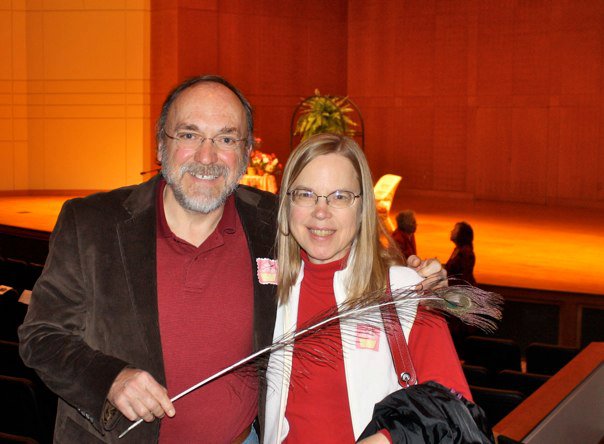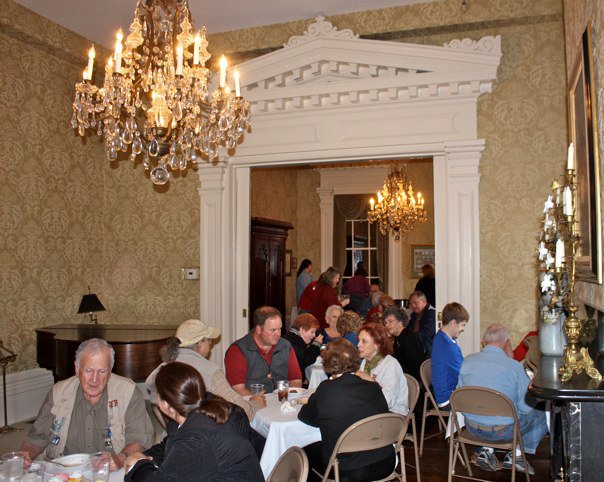Saturday, March 26, 2011
Rest in Peace, Geraldine Ferraro
Thursday, March 24, 2011
Gleaning Facebook: Cabin Tales
Don't miss "Cabin Tales" in Cave Spring
Monday, March 21, 2011
Will you still need me?
When I get older losing my hair,
Many years from now,
Will you still be sending me a valentine
Birthday greetings bottle of wine?
If I'd been out till quarter to three
Would you lock the door,
Will you still need me, will you still feed me,
When I'm sixty-four?
oo oo oo oo oo oo oo oooo
You'll be older too, (ah ah ah ah ah)
And if you say the word,
I could stay with you.
I could be handy mending a fuse
When your lights have gone.
You can knit a sweater by the fireside
Sunday mornings go for a ride.
Doing the garden, digging the weeds,
Who could ask for more?
Will you still need me, will you still feed me,
When I'm sixty-four?
Every summer we can rent a cottage
In the Isle of Wight, if it's not too dear
We shall scrimp and save
Grandchildren on your knee
Vera, Chuck, and Dave
Send me a postcard, drop me a line,
Stating point of view.
Indicate precisely what you mean to say
Yours sincerely, Wasting Away.
Give me your answer, fill in a form
Mine for evermore
Will you still need me, will you still feed me,
When I'm sixty-four?
Sunday, March 20, 2011
A Botanical Break from Storytelling
Gleaning Facebook: Tersi
I didn't take many pictures at the Southern Order of Storytellers annual winter festival. I diid take notes. I hope to write a post about it soon. But I'll go ahead and post this highlight. We got to see our good storytelling friend and now Facebook friend, Tersi Bendiberg.
Gleaning Facebook: Jean Palmer
Sheila and I attended the funeral of our teacher-friend Jean Palmer this afternoon. Her son Chuck gave the eulogy and did his Mama proud, reminding us all of why we admired her so.
One of the hardest things to accept about these birthdays that keep rolling around - only 25 hours till my next one - is that each year we find the world peopled differently. We have had some real losses the last twelve months.
I rarely saw Jean in recent years, but my life is poorer for the knowledge that I will not again see her -unexpectedly, downtown perhaps - and enjoy catching up with that bright, interesting and entertaining friend.
Comment
Eleanor Hamby
She will be missed by many. The last few years have been the unexpected meetings when we have been "out and about Rome". Jean's first year of teaching was the year that I graduated from Pepperell and we reconnected when we returned to Rome. So sorry to lose a good friend and former teacher.
Friday, March 18, 2011
Home Sweet Home

The brightest little sparkle,
with the smaller barren Luna to its right,
is home to all of us,
and everyone we've ever known or heard of.
It is the home of all of human history;
of every ancestor of every human;
of every known insect,
vertebrate,
bacterium,
diatom,
virus,
or cartoon character;
of every human thought,
invention,
fantasy,
emotion;
of every word ever spoken;
of every murder and all kindnesses; of every war and every turned cheek;
of every kiss;
of every curse;
Washington, Mao, Elizabeth I,
Hitler, Gaddafi, Herod,
Ceasar, Alexander, Monctezuma, Tutankhamun,
Curie, Einstein, Galileo,
Twain, Shakespeare, Aesop,
Jesus, Mohammed, Abraham,
Erickson, Columbus, Armstrong
... all romped on its surface as children.
The water planet.Our little blue oasis.
Home sweet home.
(The photo was taken May 6, 2010 by the Messenger spacecraft during its mission around the planet Mercury. Messenger is busy mapping Mercury and searching for asteroids in the inner solar system. It giving us the first new close-up information from Mercury since Mariner 10, thirty years ago.)
Wednesday, March 16, 2011
How to Tell a Story
Mark Twain has it about right. Telling stories is a lot like acting. The teller/actor, however tall his tale, must believe it to his toes as he tells/acts it. Here's Twain's "How to Tell a Story". I trust it is out of copyright.
Twain goes on to give examples of the self-consciously "comic" tale and the longer, more genuine, "humorous" tale. You can look it up on the web and read the rest. I found it in a copy of`A Treasury of American Folklore I found in a thrift shop recently.How to Tell A StoryI do not claim that I can tell a story as it ought to be told. I only claim to know how a story ought to be told, for I have been almost daily in the company of the most expert storytellers for many years.
There are several kinds of stories, but only one difficult kind--the humorous. I will talk mainly about that one. The humorous story is American, the comic story is English, the witty story is French. The humorous story depends for its effect upon the manner of the telling; the comic story and the witty story upon the matter.
The humorous story may be spun out to great length, and may wander around as much as it pleases, and arrive nowhere in particular; but the comic and witty stories must be brief and end with a point. The humorous story bubbles gently along, the others burst.
The humorous story is strictly a work of art,--high and delicate art,--and only an artist can tell it; but no art is necessary in telling the comic and the witty story; anybody can do it. The art of telling a humorous story--understand, I mean by word of mouth, not print--was created in America, and has remained at home.
The humorous story is told gravely; the teller does his best to conceal the fact that he even dimly suspects that there is anything funny about it; but the teller of the comic story tells you beforehand that it is one of the funniest things he has ever heard, then tells it with eager delight, and is the first person to laugh when he gets through. And sometimes, if he has had good success, he is so glad and happy that he will repeat the "nub" of it and glance around from face to face, collecting applause, and then repeat it again. It is a pathetic thing to see.
Very often, of course, the rambling and disjointed humorous story finishes with a nub, point, snapper, or whatever you like to call it. Then the listener must be alert, for in many cases the teller will divert attention from that nub by dropping it in a carefully casual and indifferent way, with the pretense that he does not know it is a nub.
Artemus Ward used that trick a good deal; then when the belated audience presently caught the joke he would look up with innocent surprise, as if wondering what they had found to laugh at. Dan Setchell used it before him, Nye and Riley and others use it to-day.
But the teller of the comic story does not slur the nub; he shouts at you--every time. And when he prints it, in England, France, Germany and Italy, he italicises it, puts some whooping exclamation-points after it, and sometimes explains it in a parenthesis. All of which is very depressing, and makes one want to renounce joking and lead a better life ...
- Mark Twian
I collect my birthday present from Sheila this weekend -- a trip to the Southern Order of Storytellers Festival. We'll hear Carmen Deedy and her talented husband, John McCutcheon, as well as several lesser known Georgia storytellers. Can't wait!
Saturday, March 12, 2011
Gleaning Facebook: Water Monitoring
This morning I became a certified water monitor with Adopt-a-Stream. Thanks David Promis. I enjoyed it. Now my students and I can get serious about monitoring the health of our little school stream, and maybe Armuchee Creek, into which it flows.
Comment
Barbara Helie
What a neat way for students to learn about the health of our water supply and all of the things that contribute to it.
EEA Conference 2011
EEA Executive Director, Paul McLendon on the mission of the Environmental Education Allience of Georgia
"We want to build a statewide culture of environmental literacy and citizenship."
I'm with ya, Paul.
From songwriter Erica Wheeler (our entertainment at lunch):
"...see that moon out your window?
I'm under that same light.
Hear me whisper your name
- I'm prayin'
may our love be never-ending
as long as somewhere the wind still blows"
and (again thanks to Erica) a quote from a Georgia settler (no specific date given, but must have been early 1800s.):
"...I saw that interesting part of the state when all was
new-waters in the creeks and rivers as clear as crystal; rich valleys, hills . .
. . covered with thick forest. A land of beautiful flowers-white, pink, yellow
and red honeysuckle (azaleas), redbud, dog-wood blossoms, wild roses and many
others. The ground was covered with violets, sweet-williams (flocks), and other
beauties. There was plenty of wild game-deer, turkey, and other varieties. When
first seen, it was in lovely spring and I was nine years old."
My Facebook friend and fellow "Triple Facilitator" Nikki Belmonte of the Atlanta Audobon Society taught a session on "Connecting Children and Communities to Birds". She led us through a little exercise that will be esy to use with our students to help them understand the odds our feathered friends face in their migrations. Unfortunately I had to leave the session briefly and realized when I returned that I had missed the very thing I wanted from the session -- how to us the Backyard Bird Count with my students.
Eddie Anderson, an Atlanta videographer, presented some ideas for using technology in EE. He designed video podcasts for Arabia Mountain and Flat Rock Baptist and sared those with us.
Scott McMahan of Garden Hood gave advice on planting for school gardens.
My favorite moment in a workshop was the illustration by our teachers from the Atlanta Botanical Garden of the importance of going beyond simple identification in interpreting nature for students (or anyone). She exhibited a Mickey Mouse pocket watch and asked us to describe it. We did so in some detail - size, shape, material, etc.
And the awards...
• our own Kim Kilgore - Project Wild Facilitator of the Year
• The Georgia River Network, Environmental organization of the year (accepted by CRBI's Joe Cook.)
Friday, March 11, 2011
Gleaning Facebook: 2011 EEA Conference
 |
| Joe Cook, Diector of the Coosa River Basin Initiative accepts the EEA 2011 Organization Award on behalf of the Georgia River Network. (with April Ingle) |
 |
| Mary Terry presents Kim Kilgore the Project Wild Facilitator of the Year award to our own Kim Kilgore of Arrowhead Environmental Education Center. |
 |
| Singer/Songwriter/Naturalist Erica Wheeler entertained at lunch. (with Vivian Davis) |
Gleaning Facebook: Wealth Winning Over Democracy
Thanks to Billy Grant for pointing me to this article. As I have said many times, unbridled socialism is contrary to human nature and does NOT work, but it is no more dangerous than unregulated capitalism. No one "earns" billions. They may be very industrious, brilliant, creative, etc, but they are also extremely lucky and their fortune is totally dependent on the hard work of thousands of folk of lesser means.
Comments:
Tersi Bendiburg
I agree with your comment, Terrell. Both extremes, a most extremes, are hurtful to society, and to the human spirit.
Tersi Bendiburg I meant to write, "...as most extremes,.."
Duane Parsons
I believe I remember the statistics reported yesterday correctly. 60% of the Freshman Senators and 40% of the Freshman House members are millionaires while only 1% of the American population is.
Tersi Bendiburg
I just wanted to remind you that I've lived, and experienced both. Actually worse, for my family and I experienced the stifling insanity for the many, double standards of the few, living in communism. Yet, as a Christian, I believe that there has to be a happy medium, where we do not live sheltered, and ignorant, of the needs of others. Of the suffering in this world. Or without the awareness that compared to many countries in the world, most of us are rich. Having all the we need and some, or a lot, of what we want.
Terrell Shaw
When I posted this my words were truncated again by Facebook's word limits.. grrrrrr! The rest went something like this:
My question for those who support continued (or even increased) "tax relief" for the wealthy is ---
At what point do you believe wealth becomes too concentrated?
Billionaires have had their taxes cut by more than 60% since the 1970s and their control of the wealth of our nation has greatly increased. CEOs "earn" nearly 300 times the pay of their hourly employees instead of the 35:1 ratio of the seventies. So I repeat, assuming that we do not want all wealth concentrated in one person's hands, at what point do you believe wealth becomes too concentrated?
Duane Parsons
CEO-to-worker wage gap has been a “hot button” for years & when I taught grad school, it was a favorite topic. Statistics & calculations are varied but the high was probably ~ 525 in 2005 & hovering ~ 400 today. Doesn’t matter-this wage gap is too high & needs to be brought under control starting with public education then public debate of the moral and ethical ramifications. I have no idea of equilibrium but I do know that widely divergent income levels throughout history have caused societal turmoil. It is only the tip of iceberg of corp. greed because CEO stock options, long-term incentive plans, & other perks are not normally (or cannot be) calculated as wages. There are other wage gaps to debate; Gender (women 82.8% of men); private equity managers & everyone else, including CEOs; professional athletes, and so on and so on. Yes, the President of the United States has numerous benefits and perks, but the compensation is $400,000/year.
Sunday, March 06, 2011
Gleaning Facebook: The Azalea Storytelling Festival 2011
A wonderful full day of stories - Ed Stivender, Sheila Kay Adams, Bil Lepp, and Donald Davis.
 |
| The stage, Callaway Auditorium |
 |
| Soup lunch at Bellevue, the antebellum home of Sen. Ben Hill. |
 |
| Callaway Auditorium |
 |
| This was our first time to hear Ed Stivender's stories in person. He's been a favorited for a quarter of a century or more. |
 |
| Ed took this pic of me and Sheila and his peacock feather. |
 |
| The former home of Sheila's grandparents on Boulevard in Lagrange. |
 |
| I had never heard of the Nancy Harts! How did I miss that? |
 |
| Lafayette |
 |
| Lafayette |






















